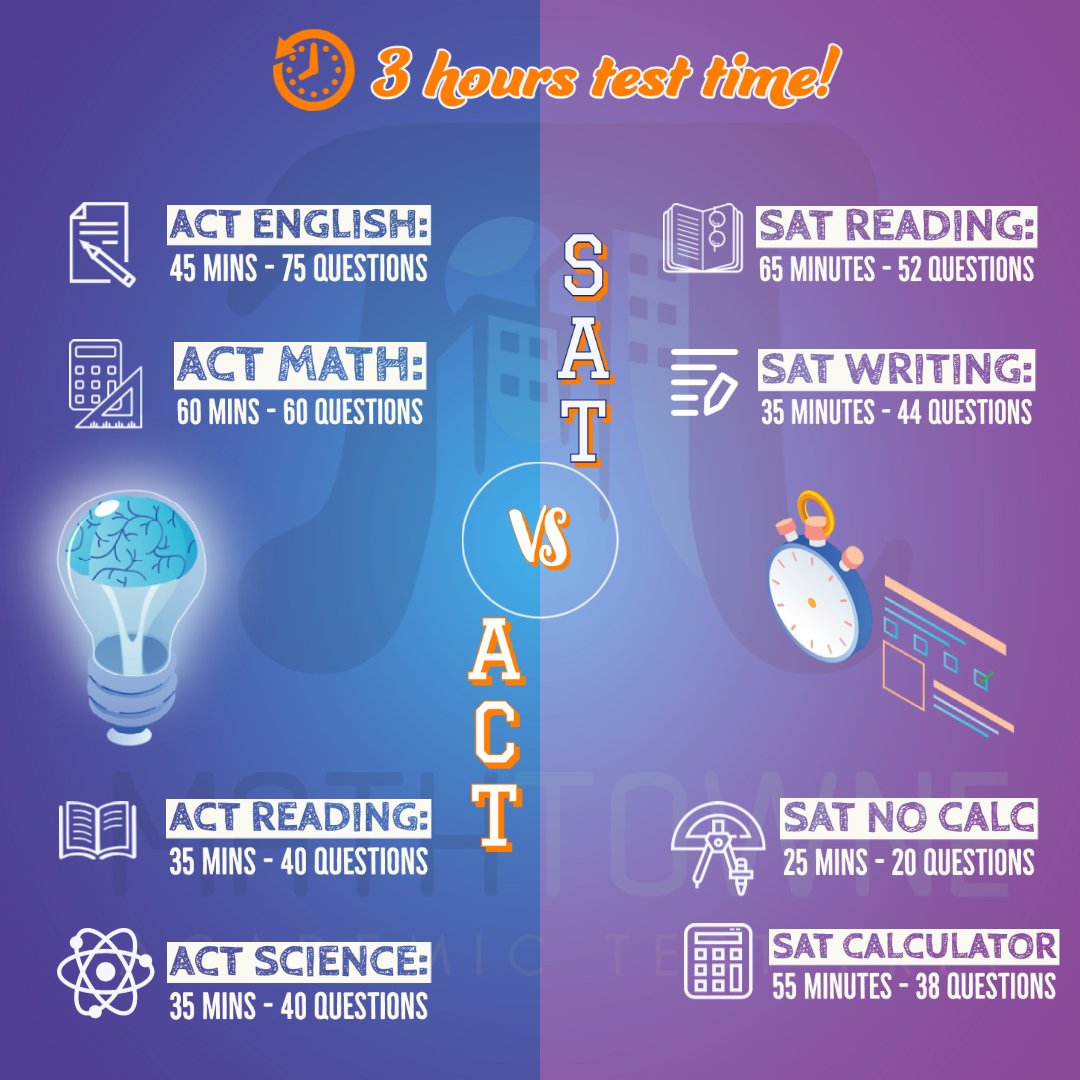Figuring out whether to take the SAT or ACT can feel like a big decision. But not to worry! Here is some information to help you decide on the test that is the best fit for you. Both tests are accepted by all colleges and universities across the country, so the decision comes down to your own personal preference and whichever test you believe you will do better on.
Let’s take a look at some of the similarities between the two tests. Then we’ll look at the major differences between them, and finally, how to choose the right one for you.
i. Similarities Between Both Tests:
- Both are nationally recognized
- Common admission requirements for colleges and universities
- Measures proficiency in various subjects
- Cater primarily to high school juniors and seniors
- All US colleges and universities accept scores from either test
- Contain reading and math sections
- Timed
- Test-takers are not penalized for incorrect answers (guess away!)
- Test fees can be waived for eligible students
ii. Differences Between Both Tests:
Here we will break down how each test differs in formatting, question type, and content.
1. Sections:
- The SAT has 3 sections: Reading & Writing/Language, Math
2. Total Number of Questions:
- SAT: 151 questions total
- ACT: 216 questions total
Please refer to the infographic below to gain a clearer understanding of the breakdowns within each section.

3. Time Limit:
- SAT: The SAT has 3 tests and a total time limit of 3 hours. With more time and relatively fewer questions on each section, you have more time to work on each question.
- ACT: The ACT has 4 tests and an optional essay. The total time is 2 hours and 55 minutes for the full test, plus an additional 40 minutes if you choose to do the essay. There are more questions on each section of the ACT so you must work at a quicker pace to get through the full test.
4. Scoring:
- SAT: scores range from 400-1600
- ACT: scores range from 1-36
More info on scoring: ACT to SAT Score Conversion Chart
5. Test Costs:
- SAT cost: $60 for the full test
- ACT cost: $66 for the full test ($91 for the full test with essay)
Note: Both tests offer test fee waivers for eligible students!
More info on test fees and waivers: ACT Fees and How Much Does the SAT Cost?
iii. Sections Breakdown:

1. Science Section:
- The ACT has a Science section. ACT Science makes up ¼ of your total score.
- The SAT has questions on scientific concepts throughout its test but does not have a full section on it. The SAT also has an “Analysis in Science” sub-score, however, schools don’t really pay attention to subscores.

2. Math Section:
- SAT Math has a “No Calculator” section (This section is only 25 minutes long and is the shortest section on the SAT.)
- ACT Math allows you to use a calculator throughout the whole test.
While relying solely on a calculator to solve mathematical problems may not be advisable, if you struggle with mental calculations and arithmetic, taking the ACT could be a more suitable option.
- The SAT provides some math formulas. You don’t need to memorize as many formulas for the SAT.
- ACT requires you to memorize all math formulas.
This is because the ACT focuses more on what is learned in high school, whereas the SAT focuses more on applying those concepts to real-world scenarios
- SAT focuses more on applying math concepts to real-world scenarios.
- ACT has a bigger focus on geometry and more questions on trigonometry. It also has some math concepts not on the SAT at all, like matrices and logarithms.
SAT pro: if you're better at algebra and mathematical data analysis. ACT pro: if you're better at geometry, trigonometry, and logarithms
- ACT Math accounts for ¼ of your total score.
- SAT Math accounts for ½ of your total score.
This means that a lower math score on the SAT will significantly drop your total score more than it would on the ACT.
- ACT Math gives you 5 possible answer options for multiple-choice and
- SAT gives you 4 options.
This means you have a 20% chance of guessing the correct answer for ACT Math versus a 25% chance of guessing the correct answers for SAT Math. And since neither test penalizes for incorrect answers, it’s better to guess than leave a question blank!
- ACT Math has only multiple-choice questions,
- SAT Math has “grid-in” questions where you write in your own answer.
ACT pro: if you prefer multiple-choice questions

3. Reading & English Section:
- SAT Reading has “evidence-support” questions. This is a big part of the SAT Reading section. These questions are connected to each other and build off previous answers, as well as cite lines directly in the text.
SAT pro: if you're good at reading questions where you have to find evidence in the text
- SAT Reading questions follow a chronological order
- ACT Reading questions are randomly ordered and are not connected with each other.
SAT pro: SAT Reading questions may be easier to follow and answer more quickly because they are connected with each other

4. Essay
- The ACT has an optional essay,
- The SAT does not have an essay section.
The SAT used to have a mandatory essay section, which then changed to an optional essay like the ACT. However, as of Summer 2021, the SAT has gotten rid of the essay portion altogether.
ACT plus: if you're good at essays and want to show off your writing skills!
iv. Figuring Out Which Test to Take
1. Sign up to take a full practice test for both the ACT and the SAT
- Compare your practice test scores and experiences
- Did you struggle more with one test versus the other? Was there a big difference in your test scores? Did you excel in a certain section on one of the tests?
2. Make sure you understand the format of each test
- Pick the test that best suits your learning style and academic strengths
- Remember that neither test is the “easy” option, but one may be better suited to your strengths
3. Look at admission requirements for the schools you’re applying to in case the school has a preference for one test over the other
- Most schools do not have a test preference, but some may (especially if you’re applying to a highly selective program)
- This also goes for scholarships!
4. Some states require either the SAT or ACT as a high school graduation requirement
- Check here to see if this includes your state
- Note: Even if your high school requires you to take the SAT or ACT to graduate, that doesn’t mean you have to send those test scores to colleges!
- You can take both tests if you want, one for the graduation requirement and one to send your test scores to colleges (ex: this could be a good option if you are required to take the ACT for your high school, but you did far better on the SAT)
5. Test popularity may depend on your region
- The ACT is generally more popular in the Midwest and the SAT is generally more popular on the East and West Coast, however, all colleges and universities across the US accept both tests!
- Regional popularity shouldn’t determine your decision to take either test
6. Both tests have 7 Saturday test dates per year
- Registration dates close about 4-5 weeks out
- The SAT has more flexibility for signing up last minute
- Upcoming Test Dates: SAT Test Dates & ACT Test Dates
7. Once you decide on which test to take, sign up for your test date and start prepping as soon as possible!
v. List of SAT & ACT Pros:
SAT PROS
- If you prefer more time on questions and/or struggle with time management on tests
- Tests on how subjects can be applied to real-world scenarios
- More time on questions
- Good at mental math
- Better at algebra and data analysis
- Math accounts for half of your total score
- Better odds for guessing on math multiple-choice questions
- Good at “evidence-based” reading questions
- Reading questions are in chronological order (may be easier to follow)
ACT PROS
- Tests on subjects learned in high school
- Better at science
- Better at geometry, trigonometry, and logarithms
- Good at memorizing math formulas
- Better for “hiding” a weaker subject score
- More multiple-choice questions (versus SAT “grid-in” math questions)
- Can use the calculator on the whole math section
- Can show off your writing skills in the optional essay!
Sources:
ACT vs SAT: 11 Key Differences to Help You Pick the Right Test | PrepScholar
ACT vs SAT – ACT Scores | ACT.org
Which is Better: ACT or SAT? | CollegeRaptor
Should You Take the SAT or ACT? | CollegeBoard
Do Colleges Prefer ACT or SAT Scores? | CollegeRaptor
ACT vs. SAT: How to Decide Which Test to Take | Best Colleges | US News
Should I Take the ACT, SAT or Both? – Pros and Cons of Each Test | Study.com
Should I Take the SAT or ACT in 2021? | PrepMaven
Do You Need to Take Both the ACT and SAT? | PrepScholar
ACT to SAT Score Conversion Chart | PrincetonReview
Is the ACT or SAT a Graduation Requirement? It Might Be In Your State | PrepMaven
How Much Does the SAT Cost? | CollegeBoard
Need more personalized recommendations?
The above tips and recommendations are broad strokes on College Prep. If you have further questions, feel free to contact us for a personal consultation. We look forward to helping you.
About MathTowne
MathTowne is a locally-based tutoring resource. We are here to support students through the key phases of their academic journey: middle school, the transition to high school, all four years of high school, and college preparation. Our staff has years of experience in creating personalized lesson plans for all of our students.

Alana is MathTowne’s skilled researcher and writer, providing valuable tips and resources through her blog posts to help students. With a B.A. in Sociology from Sonoma State University, she covers diverse topics such as study tips, college applications, test prep, and financial aid. Alana’s passions include creative writing, outdoor exploration, and stopping to pet dogs she meets along the way.
